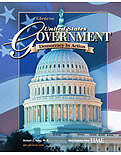1.
A) foreign governments within their own borders. B) all levels of government in the United States. C) acts of state and local governments. D) congressional actions. 2.
A) reference to "unalienable rights." B) Preamble. C) definition of citizenship. D) due process clause. 3.
A) using public tax money to support one particular religion. B) opening daily sessions of Congress with a prayer. C) having any contact with any church or religious group. D) administering oaths of office in the name of God. 4.
A) benefit students of non-Christian religions. B) have a clear, secular, nonreligious purpose. C) in its main effect inhibit religion. D) encourage "excessive government entanglement with religion." 5.
A) bad tendency doctrine. B) preferred position doctrine. C) alternative channels of communication. D) "clear and present danger" test. 6.
A) calling a dance partner clumsy when he or she steps on your toe. B) naming people who bribed a mayor in a newspaper column. C) telling customers that a baker puts insects in the raisin bagels. D) falsely accusing a classmate of cheating in a letter to the teacher. 7.
A) Near v. Minnesota. B) New York Times Co. v. United States. C) Sheppard v. Maxwell. D) Nebraska Press Association v. Stuart. 8.
A) New York Times Co. v. United States. B) Sheppard v. Maxwell. C) Nebraska Press Association v. Stuart. D) Richmond Newspapers, Inc. v. Virginia. 9.
A) enter the grounds of a county jail. B) disrupt classes in nearby schools. C) interfere with other citizens using the streets. D) interfere with trials in nearby courthouses. 10.
A) depriving a business of its customers is unconstitutional. B) picketing without a labor dispute is prohibited. C) peaceful picketing is a form of free speech. D) people cannot cross a labor picket line.







